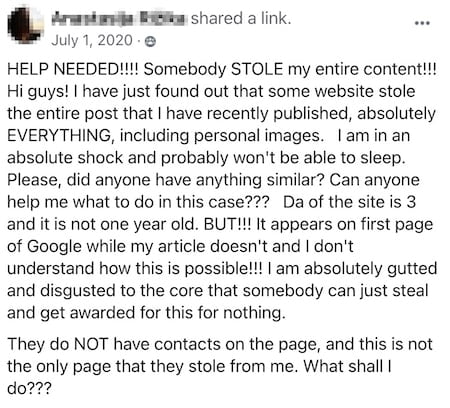Could you imagine working so hard to launch and grow your business just to end up getting sued and having to pay thousands of dollars or losing your personal assets?
Whether you’re a blogger or small business owner, you need the necessary legal pages to stay compliant with the law and prevent costly lawsuits.
In this guide, we’ll go over why you need legal pages on your website, what legal pages you need, and how to create them.
Contents
- Why you need legal pages on your website
- What legal pages do you need on your blog?
- How to create legal pages for your blog
Disclosure: You should always assume that pretty much every link on this site is an affiliate link, and if you click it and buy something you like, I’ll earn some money to help me buy a DeLorean, build a time machine, and travel back to the 90s so I can watch Hey Arnold! and eat Dunkaroos again.
Why You Need Legal Pages on Your Website
If you’re running a website, regardless of whether or not you sell products, it’s a good idea to make sure that it is in compliance with the law and with any third-party services that you might be using.
This will help protect your blog and business from getting into legal trouble and build trust with your audience.
Here are the main 6 reasons why you need legal pages on your website:
1. To Comply With the Law
The first reason is that you must comply with the law. Most state and federal laws require you to have a Privacy Policy easily accessible to your website visitors.
Failure to do so could result in you getting sued and fined by the Federal Trade Commission (FTC) or sued by your own customers or clients.
Not only can these legal battles be expensive, but also stressful and time-consuming. Honestly, you don’t want to end up sued like any of these businesses.
2. To Protect Your Intellectual Property
Everything you create and publish on your website is considered your intellectual property and it’s protected by copyright, trademark, and other intellectual property and unfair competition laws.
You might be thinking: Would people really steal my content? Even if I’m just a new blogger or small business?
The answer is yes, and it happens very often. I always see other bloggers and small business owners on Facebook Groups asking for help on what to do after someone has stolen their content.

It happened to my fitness website as well.
Someone seems to have been scrapping all of my website, including pages and blog posts, and publishing everything on their own.
Obviously, having legal pages won’t prevent this from happening, but it will allow you to take proper action by filing what’s known as a Digital Millenium Copyright Act (DCMA) takedown notice, which is what I had to do.
I had to contact the company’s hosting provider and then file a report to have Google remove their website from search engines, as this could affect my own rankings and Google SEO.
3. To Deny Personal Liability
Unfortunately, we can’t control what other people do with the information they read on our websites.
The only thing we can do is add the necessary legal pages to deny personal liability.
You might be thinking that people should be smart and not do certain things, but you’d be surprised. There’s a reason why shampoo bottles have instructions.
Besides, it doesn’t matter how hard you try, you’re still a human who can make mistakes. The last thing you want is to be legally responsible for some misinformation you unknowingly added to one of your blog posts, right?
I’m pretty sure you’ve read on other websites or heard YouTubers say that everything they talk about is for “educational and information purposes only.” They do this so their information is not taken as actual advice and used against them.
Disclaiming personal liability can be even more important depending on the type of business you’re running.
For example, if you’re running a fitness business and sell weight loss programs. People could sue you if they take your health advice and get some negative side effects or get injured from following one of your workouts.
If you have a finance blog that gives people advice on how to make money online, budgeting, or paying off debt, you have to make sure that they know your information is for educational and informational purposes only.
That way, if people invest following your advice but lose a lot of money, they can’t sue you.
4. To Disclose Your Affiliate Links
I’m also confident that you’ve seen bloggers and YouTubers mentioning how they earn a commission if you purchase some product from their links (affiliate marketing).
They do this because the FTC requires them to disclose any affiliate relationship or third-party links where they gain financial rewards, commissions, or incentives when someone clicks on them.
Again, all of this is done to protect the consumers and make bloggers and businesses more transparent.
5. To Explain Your Website Rules
Explaining what your visitors can and cannot do when visiting and interacting with your website is often placed in your Terms and Conditions page.
Adding a Terms and Conditions page can limit your liability should a customer take you to court because the intentions of the information on your website were not clear.
If you ever end up in a legal battle, a court will look at your website’s terms to determine the contractual terms between you and your visitor or customer.
6. To Explain How You Protect User Data
Visitors have the right to know about everything that goes on when they visit and interact with your website, including how you use their data.
Explaining to your visitors what type of information is collected by your website, how it’s stored, and what’s used for is often placed on a Privacy Policy page.
What Legal Pages Do You Need on Your Blog?
The only page required by the law is a Privacy Policy page, as this is typically used to protect the consumer.
Disclaimers and Terms and Condition pages are not required by the law, but they are extremely important if you want to prevent yourself from getting sued or protect yourself if you ever find yourself in a legal battle.
Let’s take a in-depth look into these three important legal pages.
1. Privacy Policy
A Privacy Policy page tells your visitors exactly what personal information you collect from them and what you do with it.
This page should be on your website regardless of whether you make money from it or not.
For example, most websites collect information such as:
- Names and emails via opt-in forms
- IP addresses and type of device with Google Analytics
- Credit card information and physical addresses when making purchases
- And more
A good Privacy Policy page should cover things like:
- Why and how you’re collecting user data
- The cookies you’re using
- Information collected through third-parties
- Compliance with General Data Protection Regulation (GDPR) law
- California Online Privacy Protection Act
- California Consumer Protection Act
- Children’s Privacy Laws
- CAN-SPAM regulations for email marketing
Another thing to remember is that laws are constantly changing to become more transparent and protect consumers, so it’s important that you stay up-to-date with everything that’s going on and update your Privacy Policy accordingly.
2. Disclaimer
A disclaimer is there to limit your personal liability for the use of your website and its content.
Basically, you want people to know that the content on your website is for informational purposes only and should not be taken as advice.
For example, as business owners, we try our best to publish accurate and up-to-date information but we could, involuntarily, miss something important or make an error.
If someone relied on our information and was hurt from the advice read on the website, they could open a lawsuit.
As mentioned earlier, the content on your Disclaimer page will vary depending on which type of business you’re running.
Here are some things you could use your Disclaimer page for:
- Letting visitors know that your content shouldn’t be taken as professional advice
- Disclosing your affiliate relationship with other companies
- Denying responsibility for third-party links on your website (ads, affiliates, etc.)
- Adding results disclaimers so people don’t expect the same results from your product or service as other customers
- Disclosing if you receive products for free in exchange for product reviews
- Disclosing sponsored posts
3. Terms and Conditions
A Terms and Conditions page, also known as “Terms of Use” or “Terms of Service” is used to explain your website rules.
Here you’ll list the behaviors you expect from your visitors as well as what they can expect from you. In case of a legal dispute, this is what can be enforced in court.
Most Terms and Condition pages will cover things like:
- The lawful use of your website
- Your intellectual property rights
- Intended age of your users
- Your right to terminate anyone’s use of your website
- Your refund and exchange policies for your products and/or services
- How and where you’ll resolve legal disputes
- Permission to use certain materials on your website, such as infographics, images, and logos
How to Create Legal Pages for Your Blog
There are three different ways you can create legal pages for your blog.
1. Hire a Lawyer
Hiring a lawyer to go over what your business is all about and have them create custom legal pages for it would be great.
This approach will give you peace of mind knowing that all the legal aspects are covered by a professional who, hopefully, knows what they’re doing.
However, for new bloggers and small business owners, hiring a lawyer might be a little too expensive.
2. Use Free Legal Templates
Another option would be to use free legal templates found on websites like LegalTemplates and LawDepot.
The problem with some legal websites is that they’re not created by actual legal professionals. Many websites that offer free legal templates have terms of use stating the information provided has not been approved by attorneys.
Also, someone who is giving out free information will most likely not spend their time staying up-to-date with everything and updating their agreements in a timely manner, which could put you and your business at risk.
People are busy, and if they’re not getting paid for something, it’s easy to not care much about it.
With legal documents, even minor changes can affect the document’s validity.
Typically, changing one clause in an agreement will require additional changes elsewhere, and failure to make such changes can leave your business with ambiguous clauses or an unenforceable agreement.
3. Use Paid Legal Templates
The last option on the list is to use legal templates crafted by an actual lawyer, which is what I do with all of my websites.
This will also give you peace of mind knowing that someone with actual experience is helping you protect your blog and business but at a fraction of the cost of hiring a lawyer.
I use Amira’s legal bundle that includes the three legal pages mentioned above—Privacy Policy, Disclaimer, and Terms and Conditions.
She is an actual lawyer, business owner, and blogger, so she knows exactly what entrepreneurs need.
Her legal templates are easy to customize—I use them for both my fitness website and this one—and can be set up within a few minutes.
She also gives you lifetime free updates, so whenever a new law is added or an old one changed, you’ll have access to it without having to pay extra.
Protect Your Business With This Legal Bundle!
To Conclude
Lawsuits can be expensive, time-consuming, and stressful, which is why I don’t mind using some of my budget to make sure that my business is protected.
Not only are these legal pages necessary to comply with the law and protect yourself, but to display transparency and build trust with your website visitors, customers, and blog readers.

